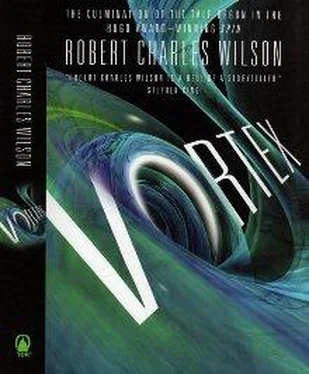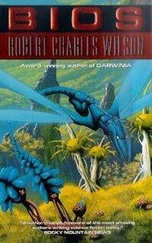She cupped her hand over the paper and looked up at me.
“Oscar wants me to go inland,” I said.
Her eyes flared, but she kept silent.
I told her about the proposed expedition. We talked about that a while, the way we talked about everything these days, calculating the effect our words might have on an unseen audience. She didn’t like the idea, but she didn’t argue about it.
Eventually she went back to her writing. I picked up one of my books ( The Collapse of Mars and the Martian Diaspora ) and took it to bed with me, remembering what Oscar had said about the “incomprehensible majesty” of the Hypotheticals. The Hypotheticals had created a string of worlds linked by Arches, one end anchored on Earth and the other on Mars, the ten vastly distant habitable planets between them comprising a continuous extended landscape, something the book called a “distributed interstellar topology.” Mars had never been an easy place for human beings to live, despite our engineering of it, and a doorway to greener, kinder worlds had been a gift too great for the Martians to refuse. But without their careful husbandry Mars had reverted to its essential nature as a cold, dry planet—one more hostile desert in a universe that seemed full of them. The Martians, like the Earthlings, had lost a habitable homeworld.
I remembered stories about the Martian ambassador Wun Ngo Wen, who had arrived on Earth during the Spin. His Mars had sounded like a saner place than Earth. The Martians had already tapped Hypothetical technology in a modest way, using it to create their famous longevity treatment. But according to the book they had eventually repudiated that and every other form of Hypothetical technology. Most of the early bionormative philosophers had been Martians, the book said. Not that they opposed biotechnology in itself—the first cortical democracies had been Martian inventions—but they insisted on restricting themselves to human biotech, which could be fully understood and controlled.
That was a shortsighted and oppressive doctrine, the book suggested.
I had put down the book by the time Allison came to bed. We still slept together, though we hadn’t made love for weeks. It was our unguarded moments that put us most at risk: there was no telling what dangerous inferences the Network might draw from our sighs and gasps. The script we had written for ourselves would play out more plausibly without passionate interludes.
But I missed her, and not just physically. I woke that night and found her mumbling a slurry of English and Voxish words, asleep but not at rest, her eyelids trembling and her face wet with tears, and when I touched her cheek she moaned and turned away.
The day before the expedition was scheduled to leave I visited Isaac Dvali in the medical suite. Oscar insisted on coming with me: he took a professional interest in my interactions with Isaac. “Your presence always has a measurable effect on him,” he told me. “His pulse rate increases when you’re with him. The electrical activity in his brain becomes more intense and more coherent.”
“Maybe he just likes company.”
“No one else has this effect on him.”
“Could be he recognizes me.”
“I’m sure he does,” Oscar said. “In one way or another.”
Isaac’s condition had improved considerably and most of the life-support machines that had been attached to him had been taken away. A crowd of physicians and nurses still hovered out of earshot, but he ignored them and looked directly at me.
He could do that now. The reconstruction of his ruined head and body was almost complete. The flesh on the left side of his skull was still translucent, and when he opened his mouth I could see the hinge of his jaw moving like a crab in a milky tide pool. But his new left eye had lost its bloodshot opacity and it focused in tandem with the other. I took a step toward the chair where he was reclining. “Hey, Isaac,” I said.
His jaw did its crab-dance under a veil of capillaries. “Tuh,” he managed to say. “Tuh-tuh—”
“It’s me, it’s Turk.”
“Turk!” He nearly shouted it.
One of the Voxish physicians whispered to Oscar, who translated: “Isaac’s voluntary motor functions are much better now but his impulse control is still very poor—”
“SHUT UP!” Isaac screeched.
Isaac had been touched hard by the Hypotheticals, which made him the next best thing to a living god. I tried to imagine how Oscar felt, being chastised by a deity with poor impulse control.
“Hey, I’m here,” I said. “Right here, Isaac.”
But the effort at speech had already wearied him. His eyelids went to half-mast. His arms trembled against the restraints that bound him to his chair. I looked over my shoulder and said, “Does he really need to be tied down?”
More consultation with the Voxish physicians; then Oscar said in a barely audible whisper, “Yes, I’m afraid so, for his own safety. At this stage of his recovery he could easily hurt himself.”
“You mind if I stay a while longer?”
I had addressed the question to Isaac, but it was Oscar who fetched me a chair. When I sat down Isaac’s eyes veered nervously until they found me again. An expression that might have been anxiety or relief played over his pale face.
“You don’t have to say anything,” I told him. He trembled against his restraints.
“He responds positively to the sound of your voice,” one of the physicians suggested.
So I talked. I talked to Isaac for most of an hour, registering his occasional grunts as encouragement. Since I wasn’t sure how much he understood about Vox or how he’d got here, that was what I talked about. I told him how we had been taken up by the temporal Arch in the Equatorian desert and how we had come to Vox after a passage of ten thousand years. We were back on Earth now, I said—Vox had some business to attend to here—but Earth had suffered considerably in all the centuries we’d been gone.
I got the feeling Oscar didn’t like me saying any of this. Probably he had hoped to introduce Isaac to Vox in his own way and in his own words. But the doctors seemed pleased with Isaac’s physical reaction, and Oscar wasn’t willing to provoke another outburst.
It was Isaac himself who ultimately shut the session down. His eyes wandered and he began to look sleepy. I took that as a cue. “I don’t want to tire you out,” I said. “I’ll be away for a little while, but I’ll come and see you again soon, promise.”
I stood up. That was when Isaac began to shake—not a gentle tremor but a full-blown convulsion. His head whipped from side to side and his eyes bulged against their paper-thin lids. The team of doctors hurried toward him as I backed away. “Turk!” he shouted, spittle frothing on his lips.
Then he stiffened. His eyes rolled up until only the whites showed. But his lips and tongue and jaw began to move, forming precise English words: “Majestic!” he whispered. “Billions of diverse components distributed over an entire galaxy! They know we’re here! They’re coming to meet us!”
The same words Oscar had used.
I glanced at Oscar. His face was nearly as pale as Isaac’s.
“Turk!” Isaac shouted again.
One of the physicians pressed a silvery tube against Isaac’s neck. His body slumped back into the chair, his eyes closed, and the chief medic gave me a look that needed no interpretation: Leave. Now.
Allison came with me to the aircraft docks the day the survey expedition was due to leave. The docks were situated on a high platform above the city, protected from the toxic air by a transparent osmotic filter. A crowd of soldiers milled around us, their gear stacked on the deck waiting to be loaded. Ocher-colored clouds swept past, somber in the raking light of the sun.
Читать дальше












